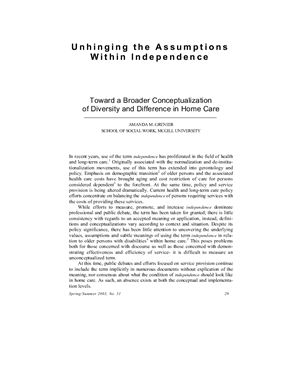School of Social Work, McGill University
Canadian Review of Social Policy/
Revue Canadienne de politique sociale
Spring/Summer 2003, No. 51, p. 28-48
In recent years, use of the term independence has
proliferated in the field of health and long-term care.
Originally associated with the normalization and
de-institutionalization movements, use of this term
has extended into gerontology and policy. Emphasis
on demographic transition of older persons and the
associated health care costs have brought aging and
cost restriction of care for persons considered dependent
to the forefront. At the same time, policy and service
provision is being altered dramatically. Current health
and long-term care policy efforts concentrate on balancing
the independence of persons requiring services with
the costs of providing these services.
Canadian Review of Social Policy/
Revue Canadienne de politique sociale
Spring/Summer 2003, No. 51, p. 28-48
In recent years, use of the term independence has
proliferated in the field of health and long-term care.
Originally associated with the normalization and
de-institutionalization movements, use of this term
has extended into gerontology and policy. Emphasis
on demographic transition of older persons and the
associated health care costs have brought aging and
cost restriction of care for persons considered dependent
to the forefront. At the same time, policy and service
provision is being altered dramatically. Current health
and long-term care policy efforts concentrate on balancing
the independence of persons requiring services with
the costs of providing these services.

